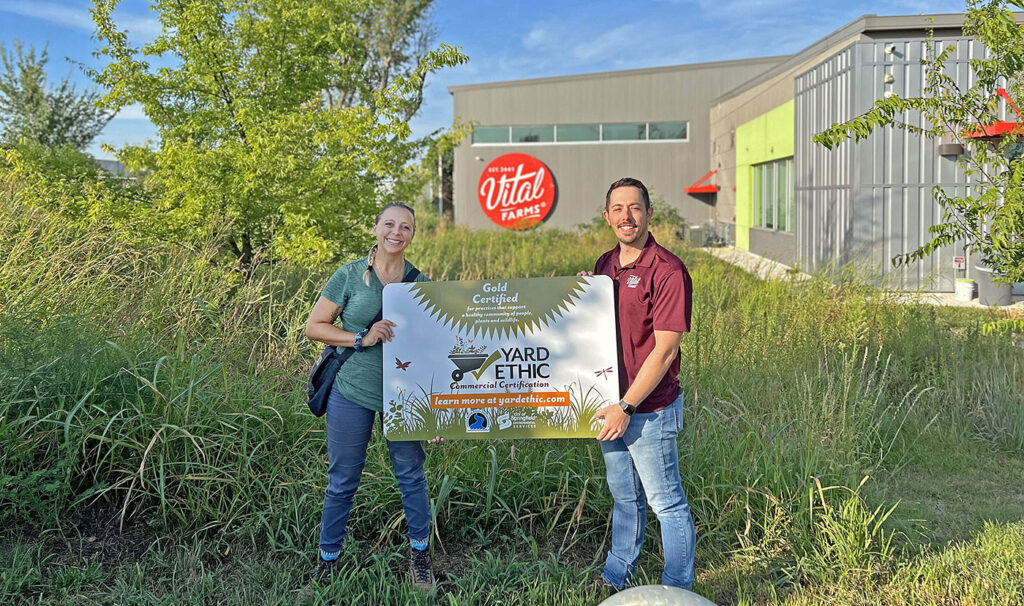
Vital Farms recognized as the first to achieve Yard Ethic commercial “Eggcellence”
Like many businesses, Vital Farms is required to treat stormwater runoff through practices that reduce flooding and remove pollution. The City of Springfield periodically inspects these features, and I was attempting to open a manhole lid on one such feature when I met Paden Grant, Health Safety & Environmental Manager, and Jared Lee, Safety Specialist I for Vital Farms. Not only are the two handy with a toolkit, but they are also friendly ambassadors of their facility, who were more than happy to talk with me about the company. “Egg Central Station,” located at 2007 N. Alliance, has several stormwater features, including an underground detention system, which prevents flooding by detaining stormwater in underground chambers, pervious pavement and bioretention (aka rain gardens). Pervious pavement infiltrates runoff on-site, and bioretention utilizes native plants and soil media to remove pollution. As previously stated, stormwater treatment is required; however, Vital Farms isn’t the type of company that just meets expectations. They aim to exceed them and continue raising the standards. As stated on their website, their mission is to “improve the lives of people, animals, and the planet through food.”
In many ways, “Egg Central Station” resembles one of the many farms where eggs are produced by their “girls.” When you enter the property, you are greeted by tall grass prairie, blooming wildflowers, and buzzing pollinators. When the building was constructed in 2017, great care was taken to work with the natural environment and preserve existing tree canopy. Of the trees added on-site, the majority were Chinkapin and bur oaks. Oaks have been shown to support a larger diversity of species than any other tree, particularly caterpillars, which grow into the butterflies and moths we rely on for pollination. Together, the preserved and planted trees provide tree canopy coverage for approximately 35% of managed green space. Straying from the conventional mowed fescue lawn, Vital Farms has established native prairie on approximately 60% of the facility’s managed green space. Walking around the facility on a sunny summer day, you can see the violet blooms of wild bergamot complementing the yellow of gray-headed coneflower and black-eyed-Susan. Here and there, the delicate flowers of flea bane and Queen Anne’s lace add accents of white. The facility maintains their prairie through controlled burns, which help reduce invasive species, promote natives and improve soil health. Proper lawn management encourages owners to “strive for five,” which refers to a desired content of 5%. A recent soil test of the prairie, completed by the James River Basin Partnership (JRBP), found soils on-site to contain 5.9% organic matter. Soil that has adequate organic matter (≥5%) is capable of infiltrating and storing water on-site. This is important, as there is no irrigation system at the facility to promote water conservation.
As stated above, improving people’s lives is part of the company’s mission, particularly the lives of their employees. The company encourages and coordinates volunteer opportunities that connect their employees with the community and the company’s mission. Due to the nature of the business, Vital Farms routinely supports Ozarks Food Harvest, donating food and contributing volunteer time. Outdoor break spaces are attractive and welcoming, providing adequate shade and views of nature, and there is educational signage which explains the benefits of the facility’s unique landscaping and stormwater features.

